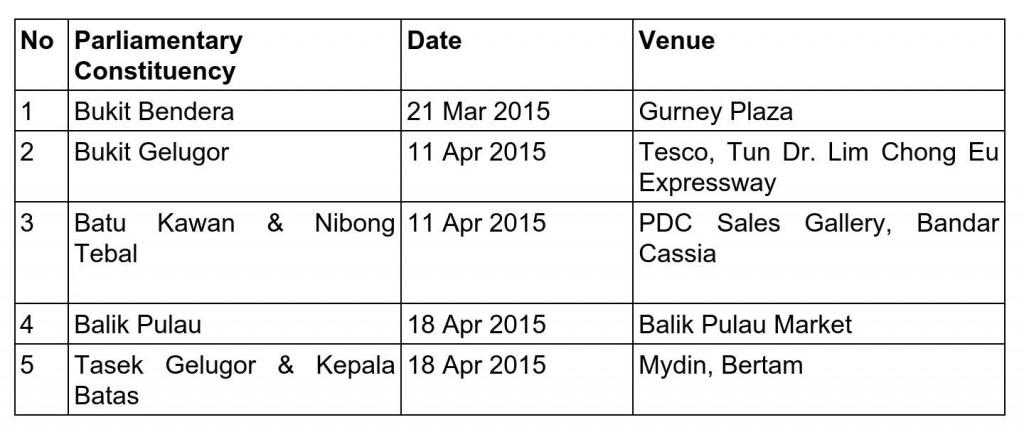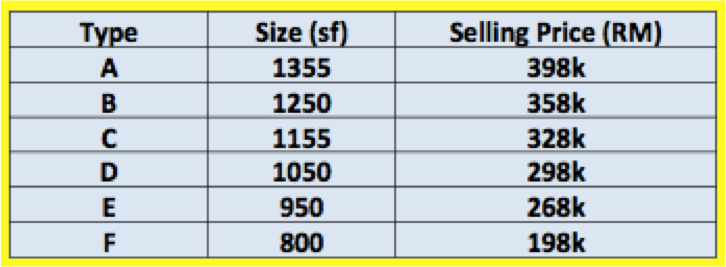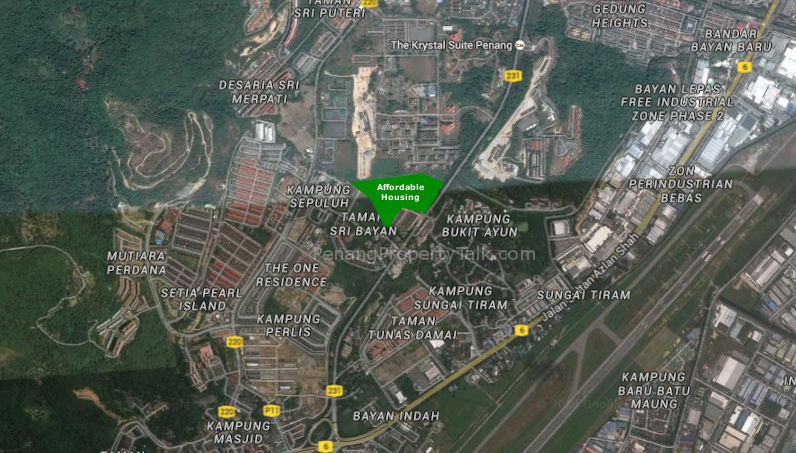Affordable Housing Taking Shape in Penang
 During an event to officiate the signing of the Sales and Purchase Agreements and balloting for Ramah Pavilion, Penang State Exco for Housing and Town & Country Planning, YB Jagdeep Singh Deo said that Penang State Government is giving top-priority to the provision of affordable housing to Penangites.
During an event to officiate the signing of the Sales and Purchase Agreements and balloting for Ramah Pavilion, Penang State Exco for Housing and Town & Country Planning, YB Jagdeep Singh Deo said that Penang State Government is giving top-priority to the provision of affordable housing to Penangites.
The State Government currently has 12 projects in the pipe-line which will see 22,545 units of low cost, low-medium cost and affordable housing units being built for Penangites. The details of the projects can be found in the link below:
Affordable Housing Projects & Location
The state driven ‘Mission Home-Possible’ programme, which is designed to educate the public of the existing projects and also to facilitate the registration of interested applicants for the said projects, which began last year, will continue in 2015 at the Bukit Bendera, Bukit Gelugor, Balik Pulau, Tasek Gelugor, Kepala Batas, Batu Kawan and Nibong Tebal parliamentary constituencies, according to the following schedule:

To make this programme more attractive, the Mission Home-Possible will now be extended to those 100% affordable housing projects by the private sector. An applicant can now choose to register for a particular project he or she is interested in. For those who are interested and qualified, the Penang State Government will be conducting an on-site registration exercise for the following projects by the private sector on the following dates:
1. Chelliah Park City
Location : Jalan SP Chelliah, DTL
Floor Size : 800 sqft (883 units), 900 sqft (165 units) and 1,000 sqft
(275 units)
Price : RM200,000.00 (800 sqft), RM300,000.00 (900 sqft),
RM400,000.00 (1,000 sqft)
On-site Registration Date : 14 February 2015
On-site Registration Venue : D’Piazza Mall, Jalan Mahsuri, Bandar Bayan Baru
Contact : Mr. John Khaw (04-630 7734 / 5)
Zubicon Sdn Bhd
70-3-16, D’Piazza Mall, Jalan Mahsuri
11900 Bandar Bayan Baru, Pulau Pinang2. One Foresta
Location : Bayan Baru, DBD
Floor Size : 900 sqft (2,685 units)
Price : RM300,000.00 (900 sqft)
On-site Registration Date : 6 – 8 March 2015
On-site Registration Venue : Ideal Property Show Room, 71, Ideal @ The One, Jalan Mahsuri
Contact : Mr. Teh (04-645 6888)
Ideal Property Group
71, Ideal @ The One, Jalan Mahsuri
11950 Bayan Lepas, Pulau Pinang3. Tri-Pinnacle
Location : Tanjung Tokong, DTL
Floor Size : 800 sqft (859 units)
Price : RM299,990.00 (800 sqft)
On-site Registration Date : 7 & 8 March 2015
On-site Registration Venue :G-Hotel, Persiaran GurneyAspen Group Office
Contact : Andrea Lee (04-227 5000)
Aspen Group
17, Green Mansion, Jalan Birch
10250 Pulau Pinang4. Ramah Pavillion
Location : Teluk Kumbar, DBD
Floor Size : 800 sqft (92 units), 950 sqft (154 units), 1,050 sqft (106 units), 1,150 (149 units), 1,250 (221 units), 1,350 (37 units)
Price : RM198,000.00 (800 sqft), RM268,000.00 (950 sqft), RM298,000.00 (1,050 sqft), RM328,000.00 (1,150 sqft), RM358,000.00 (1,250 sqft), RM398,000.00 (1,350 sqft)
On-site Registration Date & Venue :
7 & 8 February 2015 / 28 February & 1 March 2015 : Balik Pulau Market
11 – 13 February 2015 / 24 – 26 February 2015 : Bayan Baru Market
Contact : Mr. Moh (04-229 2232 / 04- 291 7921 / 04-291 7915)
M Summit Group
Unit 1, Tingkat 3, Wisma Penang Garden
No. 42, Jalan Sultan Ahmad Shah
10050 Pulau Pinang
Apart from the above dates, applicants may also register on normal working days at the site office of the said developers and the said developers will then forward the completed forms to the State Housing Department for vetting purposes in order to ascertain their eligibility.
Those who are interested in the above projects are encouraged to attend the respective roadshows on the dates as stipulated above, whereat officials from the State Housing Department will be present to register applicants specifically for the respective said projects and also to answer any queries the public may have on affordable housing projects. Please note that the registration is FREE OF CHARGE.
Applicants are advised to bring along the following documents to facilitate their registration:
- Photocopy of applicant’s identity card and their spouse
- Photocopy of certificate of marriage / sijil nikah / statutory declaration of marriage
- Photocopy of certificate of divorce or death certificate of spouse (if relevant)
- Photocopy of children / dependents’ identity card or birth certificate
- Confirmation letter of employer / photocopy of pay slip for both applicant and spouse
- Employee’s Provident Fund (KWSP) statement of applicant and spouse
- Letter of confirmation from KWSP if the applicant or spouse are not EPF contributors
- Statutory declaration of income for applicant and spouse (for those running their own business / working on their own)
- Photocopy of business registration certificate / trade license (for those running their own business)
- Form B of Income Tax (for those running their own business)
- Photocopy of OKU card (if relevant)
- Letter of confirmation by employer confirming residence of at least 5 years in Penang
The eligibility criteria for applicants for affordable housing, are as follows:-
- must be a Malaysian citizen
- born in Penang, working in Penang and a registered voter in Penang; or having resided in Penang for at least 5 years as at the date of application, and a registered voter in Penang
- 21 years old and above
- nett household income of not more than RM2,500 for low cost units
- nett household income of not more than RM3,500 for low medium cost units
- nett household income of not more than RM6,000 for affordable housing units under RM200,000
- nett household income of not more than RM8,000 for affordable housing units under RM300,000
- nett household income of not more than RM10,000 for affordable housing units under RM400,000
- for low and low medium cost units, the applicant must not have owned any property in Malaysia
- for affordable housing units, the applicant will be given priority if he or she does not own any property in Malaysia but if they have owned either a low or low medium cost unit, the applicant may still be considered
YB Jagdeep has also called upon more private developers to join in to ensure that there is enough affordable housing for all Penangites. He is also looking forward to the submission of the long awaited PR1MA affordable housing proposals.

 Many are asking the question but so few know the answer,” quips Malaysian Institute of Estate Agents (MIEA) president Siva Shanker (pic) when asked about the impact of the GST on the housing sector.
Many are asking the question but so few know the answer,” quips Malaysian Institute of Estate Agents (MIEA) president Siva Shanker (pic) when asked about the impact of the GST on the housing sector. by Charles Tan
by Charles Tan

